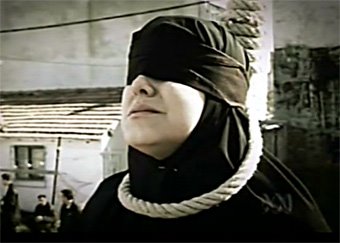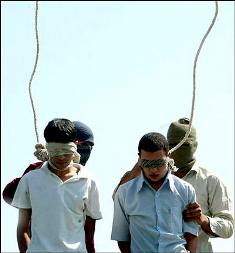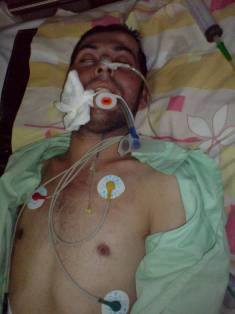
By Amir Taheri
Few people outside Iran have heard of Abdul-Malik Rigi.
Inside Iran, however, many see the 32-year old Baluch rebel as a mixture of Scarlet Pimpernel and Al Capone. In a few years, he had managed to become a thorn in the side of the emerging military-security regime in Tehran.
Rigi has been blamed for the deaths of over 100 members of the Islamic Revolutionary Guard, including several senior commanders, and members of other security organizations of the Khomeinist republic, not to mention dozens of civilians as “collateral damage.”
Last Tuesday, however, Rigi’s luck ran out when a Pakistani passenger plane in which he was travelling to an un-named Arab country was forced to land in Iran. Within minutes of the forced landing, Rigi was in the hands of the Islamic Revolutionary Guards.
The incident raises a number of questions.
First, how did the Khomeinist authorities learn about Rigi’s presence in the Pakistani aircraft?
Everyone knows that Rigi travelled with different passports, using different aliases. One must assume that he would have taken some precaution before boarding a passenger plane. In any case, this was not the first time Rigi was flying out of Pakistan. Last summer he flew to Europe for a four-nation tour.
Did the Pakistani authorities inform Tehran of Rigi’s presence in the plane?
No one, outside the two governments, could know for sure. Nevertheless, there is a possibility that Islamabad decided to terminate its hospitality towards Rigi by denouncing him to the Iranians.
This would be in harmony with Pakistani President Asif Ali Zardari’s recent attempts at wooing Tehran.
The Pakistani leader’s relations with his principal ally, the United States, have deteriorated in the past few months as the new Obama administration in Washington tried to weaken Zardari’s hold on power by flirting with his opponents.
For a while, Washington, supported by some regional allies, tried to build former Prime Minister Nawaz Sharif up as a replacement for Zardari. Washington has now abandoned that policy. But Zardari sees the US a fickle friend.
Then there is the concern that the Obama administration might suddenly drop Afghanistan as it is dropping Iraq.
In that case, Pakistan would need a working relationship with Iran that is likely to emerge as a
major player in Afghanistan.
Yet another reason for the probable change of Islamabad’s attitude may be a quid pro quo: Iran stops supporting rebels in Pakistani Baluchistan in exchange for Rigi’s capture. It is possible that a deal was made last month during an unprecedented visit by Iran’s Interior Minister, General Muhammad Najjar, to Islamabad.
If one does not agree that Islamabad has decided to put relations with Tehran on a different trajectory, one must assume that the Iranians obtained information about Rigi’s movements by bribing Pakistani officials. In that case, Zardari would have to decide whether a security service that could be bought by foreign powers has a place in the democratic system he claims he is building.
The second question that Rigi’s arrest raises is the place that armed struggle should have in the fight against an increasingly unpopular regime.
The issue has generated much debate in the past few weeks.
The regime’s success in containing opposition demonstrations during the first days of this month has prompted supporters of armed struggle to raise their voices.
The People’s Mujahedin, an Islamist-leftist group, has criticised the “Green” opposition movement for its “utopian reliance on peaceful protest.” The Party of Kurdish Life (PJAK), the Iranian branch of the Kurdistan Workers Party (PKK), has expressed similar views. A number of smaller Maoist groups have gone further by calling for urban guerrilla operations.
Iran’s democratic opposition should not listen to such siren songs.
Rigi’s arrest shows the limits of armed action and the ultimate failure of a strategy based on violence. Although the Khomeinist regime is a repressive machine, it has not yet succeeded in closing all avenues for expressing dissent.
In most cases, armed struggle degenerates into terrorism. And that provides the military-security coalition with a pretext for strengthening its hold on power and urging an even harsher crackdown against the opposition. Often, terrorism and military-security oppression form a couple engaged in a deadly dance.
Rigi’s “armed struggle” did more harm than good even to Iran’s Baluch people. His attacks enabled the regime to push aside legitimate Baluch grievances, and portray as “terrorists and foreign agents” all those who demanded a fair deal for an oppressed people.
With or without Rigi, the fact remains that Iranian Baluchis are victims of systemic discrimination.
Life expectancy in the province of Sistan and Baluchistan is a full ten years lower than the Iranian national average. Illiteracy rate in the Baluchi parts of the province is six times higher than the national average while unemployment hovers around an incredible 40 per cent.
The province is granted less than a quarter of one per cent of the public investment, much of it allocated to military projects that generate few jobs for the locals.
More than a third of the Baluch work force manages to earn a living thanks to seasonal jobs in other parts of Iran, especially Khorassan. Many more migrate to other countries of the region or to North America.
Iranian Baluch are also victims of cultural and religious oppression.
The regime spares no effort to wipe out Baluchi, an old member of the Iranic family of languages.
More than 80 per cent of Iran’s estimated two million Baluchi citizens are Sunni Muslims and as such victims of religious discrimination by a regime that bases its claim of legitimacy on an extremist version of duodecimal Shiism.
Over the past 30 years, all but four of the schools teaching Islamic Sunni theology in Iranian Baluchistan have been shut by the regime. Many Baluch clerics, known as Maulawis, have been expelled from the province and at least two dozens have been murdered in mysterious circumstances. The regime has also seized at least half of Baluchi mosques and appointed Shiite mullahs as Friday prayer leaders in some predominantly Sunni villages and towns.
For 30 years, forcing the Baluch to convert to the Khomeinist version of Shiism has been a constant policy of the regime. That campaign has intensified since the election of Mahmoud Ahmadinejad as president in 2005.
Rigi’s “armed struggle” did nothing to rectify the injustice that the Khomeinist regime is doing to the Baluch people. His capture, however, will not hide that injustice. Nor will it change the atmosphere of violence and insecurity that reigns in a large chunk of southeast Iran.
The opposition movement must address the fact that, under the Khomeinist regime, Iran’s religious and ethnic minorities are subjected to a double injustice and offer credible guidelines for tackling the problem.
Last year, Mehdi Karrubi, one of the key figures of the opposition, briefly flirted with the subject before quickly moving away from it. That is not good enough. Rigi’s capture should provide an opportunity for a more serious debate on the subject.



























































